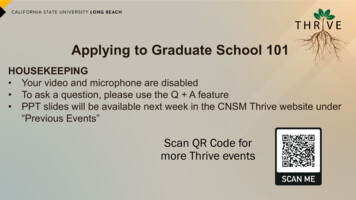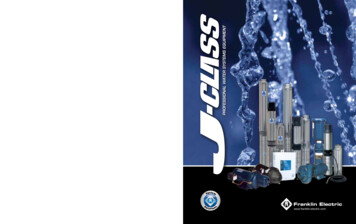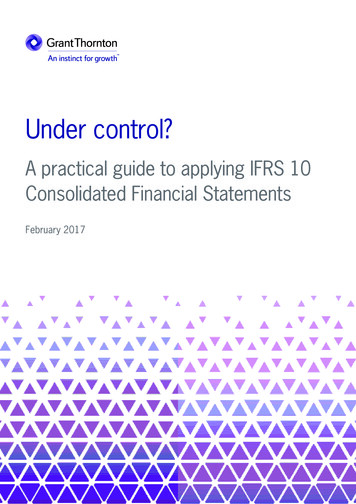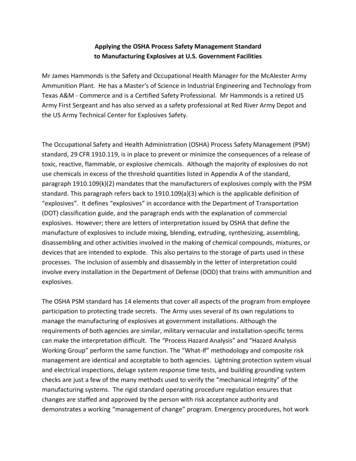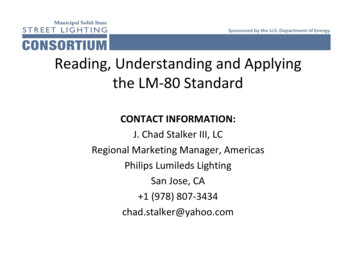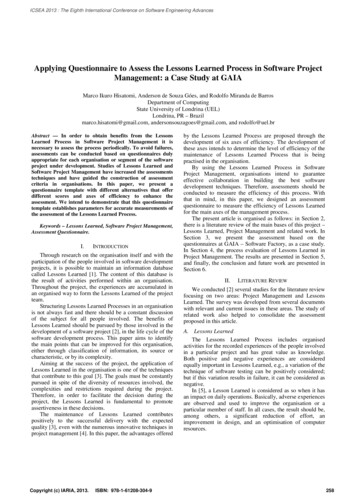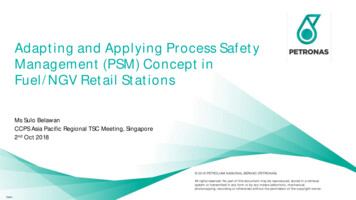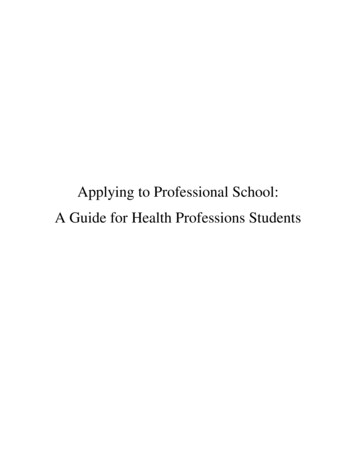
Transcription
Applying to Professional School:A Guide for Health Professions Students
Table of ContentsI.Courses and majors .page 2II.Timelines for applying page 3III.Application services page 5IV.Personal statement .page 8V.Recommendations .page 9VI.Experience .page 10VII.Admissions testing .page 12VIII.Interviews page 14IX.Financial aid .page 161
I.Courses and majorsYour major as an undergraduate is important to you for a variety of reasons. It is the basis ofyour education that you will grow from as a graduate student and the springboard of a successfulGPA. While there are no specific majors your graduate health professions programs will requireyou to pursue, there are certain core courses that must be included in your undergraduate career.Typically this includes: BiologyChemistryOrganic ChemistryBiochemistryPhysicsMath – Statistics and CalculusEnglishAlong with these basic courses, there are often other requirements depending on your chosenfield. For instance, the majority of veterinary and dental schools will want to see a course inbiochemistry. Optometry schools will require microbiology, as will physician assistant programs.Be mindful of any required courses that may be unique to certain schools as well.There will be courses that are required, and those that are recommended. Schedule-wise,required courses are your priority. Required courses need to be completed when the applicationcycle starts. Recommended courses are something of a “bonus”. These courses can be helpful tohave some exposure to for entrance exams and graduate school curriculum but they may not bemandatory for admission. Recommended courses can be in progress when you apply to graduateschool.As stated previously, there is no pre-determined major you must pursue in order to be acceptedinto graduate health professions programs. When choosing a major, it is important to choosesomething that is both interesting and challenging to you. Don’t be afraid to think outside thebox. For example, students pursuing a degree in neuroscience take the science courses needed foradmissions as well as a range of psychology courses that offer a unique perspective on humanbehavior. If that is more interesting to you than a major in Biology, pursue it.2
II.TimelinesThe process of applying to graduate school can take almost a full year. If your plan is to attendgraduate school directly after your undergraduate graduation, students begin the applicationprocess the summer following the junior year. The majority of application services will open upin early summer for you to start completing the application itself. There is quite a bit that needsto be completed before the application though. This timeline assumes you will be applying toattend graduate school directly after graduation.First Year Read Preparing for a Career in the Health ProfessionsFocus on coursework: freshman year DOES matter!Summer DO NOT take science courses over the summer Look for paid/volunteer experiences in the health care field. Begin training for anycertification you may want (for example, EMT, CNA, phlebotomy)Second Year Take Organic Chem and Physics to prepare for MCAT’s, DAT’s, OAT’s, etc (ifapplicable) Connect with professors. It’s time to be finding research opportunities and buildingconnections for references. Look into beginning an internshipSummer Again, NO SCIENCE courses over summer Begin preparing for entrance exams (MCAT, DAT, GRE, etc) Participate in internship, paid/volunteer experienceThird Year Complete required courses for admissions Attend PHPAC meeting Begin preparing portfolio: firm up recommendations, write resume, etc. Put together school list and plan possible visits Register for and take entrance examsSummer Begin application process Continue with health-related experience Submit completed primary application3
Fourth Year Complete supplemental applications, if applicable Complete graduation requirements and “recommended” courses Prepare for interviewsTiming of applicationsThe application cycle begins the year before matriculation to graduate school. This means thatthe end of your junior year can mark the beginning of the application cycle. In order to completeyour application on time, the following must be complete: all required courses any paid/volunteer health care experience recommendations personal statementFor those of who have taken courses at other institutions, copies of your transcripts from thoseinstitutions will be needed as well.Centralized application services will open the application cycle typically in the summer. Whilethe deadline for a particular program may not be until November, that does not mean you shouldwait until then. The majority of schools run their applications on a rolling basis which meansfirst come, first served. Schools will not wait until a November deadline, for example, to maketheir decisions. In fact, seats will start filling up much sooner than that.In order to submit your application sooner rather than later, it is important to have the othercomponents of the application packet complete. This means your recommendations should besubmitted to the application service during the summer (June or July). Adding schools to yourlist in the fall is fine but do not wait until then to start asking for recommendations. A good ruleof thumb is to provide the writer at least four weeks to craft a well-written letter. If you areasking a professor or medical professional that you know has a very busy schedule or will bewriting letters for many students, more time should be allowed. Letters of recommendation willbe discussed more thoroughly later.Like recommendation letters, entrance exams must be completed and ready to submit when theapplication process starts. At least one set of test scores should be provided to your schools uponapplication. If you are taking your entrance exams again, check the dates that your school willaccept. Some places will put a time limit on entrance exams, not letting candidates continue totake the exam and submit those scores for consideration after a certain point in the year.4
III.Centralized Application ServicesThe majority of graduate health professions utilize a centralized application service to streamlinetheir application process. Much like the Common Application for undergraduates, centralizedapplication services serve as a starting point for almost all students applying to graduateprograms.AMCAS – American Medical College Application ServiceThe American Medical College Application Service, or AMCAS, is for first-year applicantsapplying to allopathic (MD) medical schools. While not all schools use the AMCAS application,the great majority do. A grade point average is calculated cumulatively as well as a combinedBiology/Chemistry/Physics/Math GPA. AMCAS counts ALL courses, including repeated gradesand courses taken from any undergraduate institution, even if a degree was not earned. Alltranscripts, letters of recommendations, and test scores are sent to and distributed throughAMCAS.AACOMAS – American Association of Colleges of Osteopathic Medicine Application ServiceAll osteopathic medical schools require applications submitted through AACOMAS. Acumulative grade point average and separate science grade point average is calculated throughAACOMAS. Only the last instance of a repeated course is counted. MCAT scores and transcriptsmust be sent to AACOMAS directly. Letters of recommendation are sent to the specificosteopathic medical schools.AADSAS – Associated American Dental Schools Application ServiceAADSAS is used by all American and Canadian dental schools. To begin the process, studentsmust register for DENTPIN. This identification number will be used both for the applicationprocess as well as registration for Dental Admissions Tests. Expect questions specific todentistry, including dental and research experience and examples of manual dexterity. AADSASdistributes transcripts and recommendation letters to the specific colleges.VMCAS – Veterinary Medical College Application ServiceThe majority of US and international veterinary schools use VMCAS. Applicants are expected tosubmit the application, all fees, and letters of evaluation directly to VMCAS. Transcripts andstandardized test scores, however, are sent to the schools directly. VMCAS does not allow ANYchanges once the application is submitted.5
OptomCAS – Optometry Centralized Application ServiceAll optometry schools participate in OptomCAS. All test scores, letters of evaluation, andtranscripts are distributed through OptomCAS. Essays can be individualized for each specificoptometry school and applicants are responsible for uploading the correct essay to each school.AACPMAS – American Association of Colleges of Podiatric Medicine Application ServiceAACPMAS is used by nine podiatry schools in the United States. All coursework must beincluded, including repeated coursework and courses taken at other institutions even if a degreewas not awarded. Standardized test scores need to be submitted to AACPMAS. This can includeMCAT, DAT, or GRE scores depending on the school.CASPA – Centralized Application Service for Physician AssistantsMost physician assistant programs use CASPA. Deadlines vary among the schools so CASPAsuggests four to six weeks for processing time to meet all deadlines. GRE’s are required forsome programs and must be sent directly to the schools, not through CASPA. Students mustsubmit a minimum of three references to CASPA even if their program requires less.PharmCAS – Pharmacy College Application ServiceMost pharmacy programs in the United States use the PharmCAS application. Applicants submitall transcripts, letters of evaluation, and test scores through PharmCAS. Students registering forthe PCAT, Pharmacy College Admission Test, must register to have their scores submitted toPharmCAS. They will not automatically be sent to the PharmCAS.PTCAS – Physical Therapy Centralized Application ServicePTCAS is used by many of the physical therapy programs. All coursework is entered as well asGRE scores, if applicable. Letters of reference are also sent through PTCAS. The website detailsspecific program requirements regarding academics, letters of reference, and PT observationhours.6
IV.Personal StatementAll programs will expect some sort of personal statement or essay from you with yourapplication. While this piece of the application process may not seem as important as a stellartranscript, do not underestimate the value of this narrative. The personal statement is one of thefew pieces of your application that will reflect your unique perspective and experiencesthroughout this process. The personal statement is an opportunity to set yourself apart from thethousands of pieces of paper that flood admissions offices.One very basic rule to remember when writing your personal statement: edit, edit, edit. Poorspelling and incorrect grammar will ruin even the most captivating personal statement. Theadmissions team wants to be both interested by your story and impressed by your thoughtfulpresentation. Take advantage of any writing assistance offered to polish the final draft of yourpersonal statement.Writing a narrative like a personal statement may be a bit foreign to you. There are many ways toapproach the topic and many different avenues to take once you begin writing. A fewsuggestions to focus your writing: Why are you attracted to the profession? What is your view of medicine and the profession? How have you prepared for both medical school and your career? What attributes do you have that will make you a successful doctor/veterinarian/etc.? What have you accomplished both personally and professionally that is meaningful toyou?If you have been captivated by your experiences delivering medical care to inner cities, captivateyour reader. Action-oriented phrasing paints a much better picture. For example, “I’m good withpeople” does not have the same imagery as “During my two years as a CNA, I have builtwonderful rapport with my patients”. Try to avoid clichés like “I’m good with people” and usemore specific examples and straight-forward language. Illustrate your accomplishments andsuccesses in these experiences and show the reader how they have shaped your future plans.7
V.Letters of RecommendationLetters of recommendation are an important part of the application packet. These letters are anopportunity to further display your accomplishments and interests. Choosing who will write yourletters of recommendations is very important. As you pursue your education, it is important to becreating relationships with faculty. The majority of programs expect to see a letter from at leastone faculty person with whom you have a connection. This faculty person must be able to speakto your successes either in the classroom or laboratory as well as what drives you to pursue yourchosen path. It is important that they see you in a professional, mature manner in order to write aletter that is of the most use.Typically, each health profession will want to see a letter from a member of that field. Lettersfrom doctors, dentists, and veterinarians should be able to speak to some sort of field experience,whether it is shadowing, volunteer, or work experience. Again, these letters should address youas a future professional in the field. The letter writer should be able to speak to your rapport withpatients, your ability to adapt to changing situations, your eagerness to learn more about thechosen field.Often, graduate health professions will request a committee letter. At the University of NewEngland, the Pre-Health Professions Advisory Committee, or PHPAC, writes these committeeletters for students applying to a variety of graduate health professions fields. The procedures forthe applying to the PHPAC are outlined in the Pre-Health Professions Advisory CommitteeWorkbook, which can be found on the website. Students should plan to apply to the PHPAC theMarch before their application begins. The PHPAC evaluates students based on grade pointaverage, health care experience, letters of recommendations, a personal statement, and a resume.It is important to begin requesting letters of recommendation as soon as possible. Professors andhealth care professionals will need time to craft a well-written letter and submit that letter to theappropriate place. It is also important to make your request early in case you are turned down.There are many reasons an individual may not be willing to write you a letter, including nothaving enough time to write a good letter. It is important that you, as a professional, respect thatdecision. Be sure to have more than one person in mind to write your letter and plenty of time torequest it of that person.8
VI.ExperienceExperience in the health care realm is important for a variety of reasons. Immersing yourself inyour future profession will help solidify whether or not this is the right path. There may beaspects of the field that are not immediately apparent until you are in the middle of things. Yourhealth care experience also gives you a chance to introduce yourself to professionals in the field.Recommendations from current practitioners are a key component to your admissions packet aswell creating a network of professionals to connect with when you graduate. Finally, havingtaken on the challenge of a job or volunteer responsibility while in school shows the graduateprograms that you are committed to being in this particular field and able to manage the demandsof the position while in school.There are several ways to go about getting appropriate health care experience. It’s important toremember that patient contact can be volunteer or paid work. A job as a certified nurse’sassistant (CNA), EMT, or phlebotomist will give you many patient experiences as well as apaycheck.InternshipsMany students find a valuable resource in our internship office. Internships through the CASInternship Office are credit-bearing experiences that will introduce you to the field in aprofessional and supervised way. Some internship examples have included dental assistant,genetics counseling assistant, and medical technician. These internships can be done during theschool year or the summer in a variety of locations. For many students, this is the first valuablestep into the health professions career they hope to pursue. Typically internships are geared moretowards shadowing and exposure to the field, not necessarily to accumulate patient contacthours.ShadowingFor students questioning their direction in the health care field, shadowing can be a valuableopportunity. A shadowing experience with multiple health care practitioners can give you a widepicture of the different pieces that make up the health care field. For example, students unsureabout their interest in either physician assistant or osteopathic medicine may shadow multiplepractitioners in both fields to find where their interest and passion will truly lie. A “day in thelife” of both professionals will help you find focus.VolunteeringThere are organizations willing to take on volunteers to assist in the health care field, thoughyour exposure to patients may be limited. Hospitals and clinics often need volunteers to assistpatients. Oncology and dialysis centers, for instance, may be looking for volunteers to help keeppatients comfortable during their treatments. Community health centers may use volunteers to9
deliver health education to schools and community members. While you may not be following adoctor from room to room, these experiences will expose you to other important aspects of healthcare.EmploymentThe variety of careers that make up the “health professions” seem to be never-ending. Whilemany of you aspire to doctor and dentist, there are many support professionals that play animportant role. Certified nurse’s assistants, dental assistants, and EMT’s are just a few of theareas you can pursue that will serve you in many ways. These medical support professionals arein constant contact with doctors, dentists, veterinarians and the like and they gain a realisticpicture of the health care system. You will have exposure to a number of professional contactsand hopefully a chance to pick their brain about what makes a doctor a doctor and if it is whereyou fit. Having a job in college can be a challenge but it is not without its rewards. The paycheckis of course a benefit but so is the challenge of managing both employment and school work.This level of maturity and responsibility is valued by the graduate programs you will be applyingto.VII.Admissions Testing10
There are a variety of admissions tests students take when entering graduate school. It alldepends on where you are heading. Not all health professions schools require MCAT’s; not allgraduate programs require GRE’s. It is important for you to know what is expected andapplicable to you in the admissions process.Also important to research are what subjects will be covered by each particular exam. This willinform your study practice. Exams which cover a large amount of science content will mostlikely require a significant amount of studying. Topics such as perceptual ability on the DATmay be best practiced through art classes such as ceramics or drawing.There are many resources available to students to prepare for admissions exams. Practice tests,study guides and test prep books can all be very effective means of studying. Many of the examsoffer test prep material that is very helpful and often free of charge.MCAT (Medical College Admission Test)The MCAT is a standardized, mostly multiple-choice exam. It will test applicants grasp ofscience concepts, ability to read comprehensively, and problem solve. The MC
all transcripts, letters of evaluation, and test scores through PharmCAS. Students registering for the PCAT, Pharmacy College Admission Test, must register to have their scores submitted to PharmCAS. They

